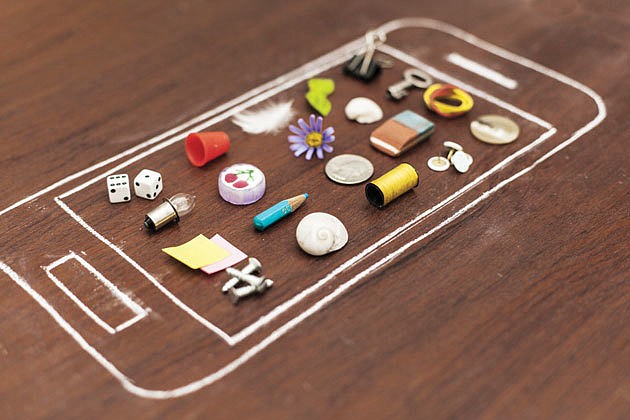- April 30, 2024
-
-
Loading

Loading

My daughter called. From the tone in her voice, I could tell she wished she were 6 again instead of thirty-something and Mom would make whatever this call was about all right.
“I fell down in the parking lot going to my car in the rain,” she said. “And my knee is killing me and I’m not sure I can drive, and NO I wasn’t using my phone.”
A few days later, I was in a two-day training seminar. Its participants were a cohort of about 20 people, all seasoned professionals whom I would never describe as digital natives — more like digital immigrants — and each one of us was glued to our phone. They sat next to our training manuals like little black note pads as if they were part of the table setting. If a text came in — didn’t matter who was presenting information at the front of the room — it would be responded to in a very matter of fact fashion. No one seemed to think that was out of order or rude.
There you have it, I thought while driving home. The smartphone is so ubiquitous, it is part and parcel of our existence. Is this a good thing? Certainly, it’s a convenience having this small rectangle that contains so much information about your life — a take-along photo album of inestimable size, your Rolodex, your encyclopedia for immediate information from obscure facts to the score of the game, a book, a movie screen, a television show, an exercise monitor or coach, the weather report, your alarm clock, it’s endless — oh yes, let’s not forget, a telephone, too.
My husband, Jack, seems perfectly content with his flip phone. Yes, they still make flip phones, although last year AT&T sent him a new one — for free — because its bandwidth was being replaced. Jack says smartphones make people dumb. He still likes to use a thesaurus and a dictionary and some kind of a digest that gives you baseball stats that go back to the 1930s.
“This generation won’t remember anything because it takes so little effort to research anything. They won’t have to put the pieces together to come up with a theory,” he contends. “It’s all Googletized.”
Come to find out, lots of scientists agree with Jack. In a spate of new research coming out during the past year, scientists at the University of Texas and other institutions have been publishing research done to understand the “brain drain” effects of phones. In a recent project, published in the Journal of the Association for Consumer Research, two groups of consumers were asked to use their phones in different ways. Turning them off, putting them face down, in a purse, etc. It seems the more consumers depended on their smartphones — they self-identified themselves as “dependent” — the more they seem to suffer from its presence. Yes, presence. Knowing that their phones were near, reduced their cognitive abilities.
Commenting on the findings, lead author Adrian Ward, who is well known in this area of research said: “Our smartphones enable —and encourage — constant connection to information, entertainment, and each other. They put the world at our fingertips, and rarely leave our sides. Although these devices have immense potential to improve welfare, their persistent presence may come at a cognitive cost. Even when people are successful at maintaining sustained attention — as when avoiding the temptation to check their phones, the mere presence of these devices reduces available cognitive capability.”
In a recent article in Time’s online magazine Time Health, Nicholas Carr, a technology writer and author of “The Shallows,” a book about the internet’s effect on our minds, said: “If you’re always pulling facts from Google, you can answer a trivia question, but you’re not building up the knowledge base necessary to be a deep and deliberate thinker.”
In other words, like an atrophied muscle, your brain’s ability to perform heavy lifting may be compromised. “Your mind may also struggle to filter what’s important or real from what’s counterfeit,” Carr says in a nod to “fake news.”
A recent study from Stanford University backs him up. The Stanford researchers discovered that students struggled to differentiate real news from promotional stories, even when an article was clearly labeled with a term like “sponsored content.”
I don’t know about you, but I have enough things chipping away at my cognitive ability without adding brain drain from my smartphone. Here are some things you might consider as the foundation of a sort of digital detox.
Kristine Nickel is a marketing communications consultant and former marketing and public relations executive. For more than 30 years, she has relieved her stress by writing features for publications across the country.